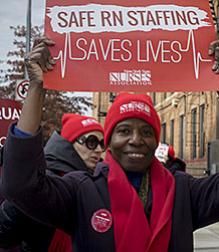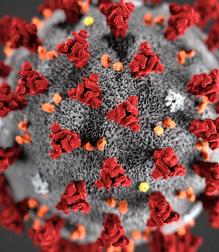
Nurses know better than anyone that the American food industry has contributed to an epidemic of obesity and hypertension unprecedented in recent history through unfettered advertising, food additives and mono-crops. If we fail to address the devastating impacts of ‘Big Food’ then this could also become a nation whose population is also facing a wellness crisis.
According to The New York Times, a huge portion of the money spent on healthcare in this country treats chronic diseases linked to diet. But it’s not just the health of individuals at risk, the health of the planet is also suffering. Even President Obama acknowledged that “our agriculture sector actually is contributing more greenhouse gases than our transportation sector.”
Small family farms across America have largely been replaced by mega-agricultural corporations operating huge livestock feeding lots and a concentrating of our food production in large-scale facilities and on giant farms.
Much at stake
The agricultural industrial complex is a $1.5 trillion-dollar industry in America — that’s trillion with a T — with big corporations from farms, to feeding lots, to grocery stores controlling almost the entire process from seed to table.
In a groundbreaking decision that supported genetically-modified foods, the U.S. Supreme Court ruled in favor of seed patents — fertile soil for mega-agribusiness Monsanto, which was already developing many genetically-modified (GM) seeds. There is growing concern that introducing foreign genes into food plants may have an unexpected and negative impact on human health. The British Journal Lancet examined the effects of GM potatoes on the digestive tract in rats and found “appreciable differences.” Considerable study continues on the essential question of the harm of GM foods.
This whole system has remarkably little oversight. And we’ve seen the consequences — under-regulated fertilizer, pesticide and herbicide saturated mono-crops of soy and corn replacing small scale multi-crop farms, increases in greenhouse gases produced by large livestock operations, and even recent outbreaks of food-born diseases stemming from large washing and packaging plants.
President Obama did try to fight back and exert some much-needed control over the food industry — enough so that a group backed by pesticide and fertilizer producers called the Obamas, “organic limousine liberals” and called on Michelle Obama to use pesticides in the White House garden.
President-elect Trump now inherits a beautiful garden full of healthy organic foods. How will his garden grow?
It is certain that corporate agriculture will try to exert influence over the new administration at the expense of the family farmer and at the expense of the health of our nation.
There is an alternative model for feeding our nation using fewer chemicals, causing less harm to the environment and promoting healthier eating habits. That alternative comes from a country that couldn’t be more different from ours — Cuba.
What Cuba can teach us
Because of the USA-led embargo and the collapse of the Soviet Union, the tiny island nation was left in a precarious food situation, unable to import fertilizers, pesticides, or food products to feed its citizens. It also meant that what food Cubans could grow, they mostly ate themselves instead of cycling through livestock.
At the same time, the Caribbean island had to solve the problem of farming in the age of extreme weather events.
These factors contributed to Cuba being far more prepared for situations now facing many nations across the planet. Cubans mastered what is now called “agro-ecology” in contrast to our country’s mostly industrial agriculture. Small scale farmers in Cuba are leading the country’s agricultural movement and promoting sustainable practices like planting flowers to attract helpful insects and nitrogen producing beans to fertilize the soil. Cubans had to find creative ways to till the soil and plant crops without fossil fuel-fed machinery.
Out of necessity
Cuba now produces almost all of its own produce and much of its own meat. These agricultural advancements were not made out of ideology. Rather, Cubans acted out of necessity, to meet the needs of a hungry people.
Cuban agriculture can in some ways be seen as an example for the United States of an agricultural system that is sustainable for the health of our people and the health of our planet.
Already, scientists fear that our planet is on the brink of no return from global warming. If we don’t scale back our agricultural use of fossil fuels we could tip the thermometer permanently for our warming planet, leading to the same kind of food insecurity across the globe that Cubans faced.
It’s time for nurses to invoke our commitment to public health and take a firm stand for sustainable farming that will help grow healthy people and a healthy planet now and into the future.




